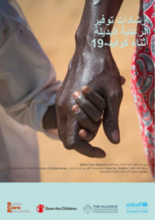This document provides practical guidance to actors in humanitarian and development contexts on the adaptations and considerations needed to support children who are either currently in alternative care or are going into an alternative care placement during the COVID-19 pandemic.
It expands on the guidance provided in the Interagency Technical Note on Children and Alternative Care Immediate Response Measures by providing more detailed guidance for the medium and long-term response, recognising that the current pandemic and measures to address it are likely to continue over prolonged periods of time, and also to be reoccurring in phases. It should be read alongside the Technical Note: Adaptation of Child Protection Case Management to the COVID-19 Pandemic.
International standards and guidelines on children’s rights and alternative care always remain applicable, including in the context of this pandemic. However, COVID-19 poses specific challenges and risks to children with regards to appropriate care both at the policy or system level and in work with individual children. This includes: the potential temporary need of alternative care when caregivers become ill or die, the availability of placements including at borders or while children are in transit, the increased risks in residential care settings, and the strain on existing child protection and child welfare services.
Emergency situations can also increase the risk of inappropriate recourse to alternative care and result in an influx of children into residential care and the establishment of new childcare institutions. This can happen during the crisis and post crisis, if residential care is promoted as the primary means of providing support to children who have lost a caregiver or been made vulnerable due to COVID-19. Efforts to pre-emptively scale up and strengthen the capacity of family-based care and social protection systems are critical to enhance family resilience and prevent the unnecessary recourse to residential care. As there are already existing resources available related to the provision of alternative care services, this guidance focuses specifically on how alternative care provision needs to be adapted in light of COVID-19. Broader resources and tools to assist in implementation and decision-making are referenced but not restated.
Read the English version here.

